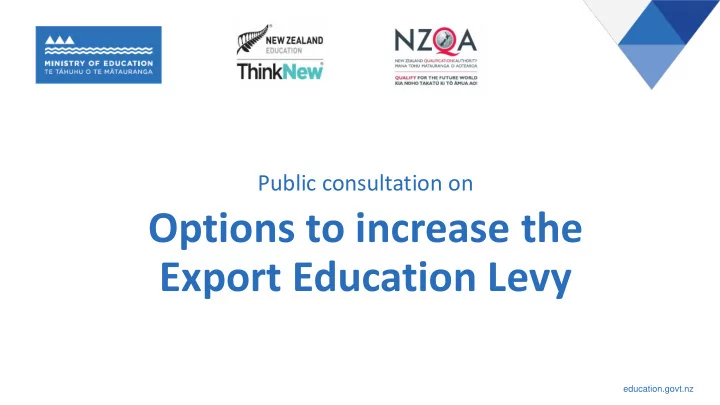

Public consultation on Options to increase the Export Education Levy education.govt.nz
Agenda for the consultation 5 minutes Welcome, housekeeping, introductions 15 minutes Presentation 60 minutes Q & A 10 minutes Conclusion education.govt.nz
Quality international education education.govt.nz
What is the Export Education Levy? • The EEL is an industry levy paid by all providers who enrol international students, as a percentage of international student tuition (0.45%). • Most of the EEL covers: o promotion and marketing o administration of the Code of Practice, the Dispute Resolution Scheme, and the levy o funding to organisations through the International Student Wellbeing Strategy to support wellbeing initiatives • The EEL also allows us to safeguard the financial and educational interests of international students enrolled in private providers in cases of programme or provider closure through reimbursements. education.govt.nz
Current operational context of the EEL • Reimbursement costs related to provider closure have historically been low (average of $150,000 per year until 2016). • The EEL paid out $3.2 million in closure-related reimbursements in financial year 2017/18. We expect significant pay-outs from the EEL in the next 2-3 financial years (between $2.0 and $4.0 million per year), based on risk characteristics identified by the New Zealand Qualifications Authority. • If we make no changes, the EEL account balance will soon be zero. We will be unable to make further closure-related reimbursements. • As the EEL account is not able to go into overdraft, we have arranged an advance of up to $6 million, to be repaid in full by the EEL by 2024, to enable reimbursements to continue. education.govt.nz
EEL cash balance, revenue, annual costs and reimbursements, 2002-2018 education.govt.nz
EEL expenditure 2017/2018 International Student Wellbeing Funding Reimbursement of $0.67M international students 8% $3.21M 38% Promotion and Marketing (ENZ) $3.27M 39% 2% EEL administration 10% 3% (MOE) $0.14M Code of Practice Dispute Resolution Scheme administration (FairWay Resolution) $0.22M (NZQA) $0.82M education.govt.nz
EEL-funded promotion and marketing ENZ carries out promotion and marketing to: • Raise awareness of New Zealand as a destination • Maintain and refresh the New Zealand ‘ ThinkNew ’ education brand • Support promotional activities abroad and in New Zealand. EEL-funded market research shows that prospective students’ preference for New Zealand education increased from 5% in 2014/15 to 15% in March 2018. education.govt.nz
EEL-funded promotion and marketing activities in 2017/18 • 24/7 digital marketing via StudyinNZ.govt.nz and social media channel • Developed MyStudyNZ • Launched global ‘Future Proof’ campaign to promote New Zealand’s number 1 ranking for educating for the future • Tested a refreshed New Zealand education brand framework • Developed targeted international education regional strategies education.govt.nz
New Zealand Qualifications Authority NZQA leads quality assurance of non-university tertiary providers. It: • registers providers and approves qualifications and programmes of study, including those offered to international students • regularly monitors and reviews the quality of providers and programme delivery (including External Evaluation & Review — EER) • has a distinct set of rules for private tertiary providers, and a range of regulatory tools to use when quality issues arise, including formal investigations and closures. education.govt.nz
NZQA investigations • NZQA has 40 to 50 investigations underway at any one time - 74% quality issues (assessment, programme delivery) - 26% compliance issues (Code, Student Fee Protection) • Investigation outcomes - 52% corrective action taken by provider - 34% significant intervention by NZQA - 14% minor or unsubstantiated • Firm action taken where there is a problem - improvement plans - statutory intervention education.govt.nz
NZQA actions since July 2017 • 8 PTE registrations cancelled • 6 claims against the EEL - 4 provider closures - 2 programme closures - $3.2 million paid • Represents less than 2% of approximately 450 providers that are quality assured education.govt.nz
Risk factors linked to quality issues • Significant changes in student numbers • Changes to the delivery profile of a provider (type, level of education) • Large cohorts of international students from a single source country • Low levels of learner academic and English language proficiency • Poor quality assessment and moderation • Lack of appropriately qualified and experienced staff • Governance and management not clearly separated • Promotion of low tuition fees education.govt.nz
Options to increase EEL revenue 1. Differential increase for all providers • PTEs from 0.45% to 0.83% • Other providers from 0.45% to 0.55% 2. Increase for PTEs only • From 0.45% to 1.24% Both options acknowledge that only PTEs generate closure-related costs. education.govt.nz
How the options were identified • Independent financial modelling was carried out on three broad scenarios for future revenue and expenditure (we expect some short-term reduction in EEL revenue due to decreased enrolments). • The rates in the proposed options were calculated based on a moderate scenario. • Both options can be in place by 1 January 2019, and both enable full repayment by 2024. education.govt.nz
Proportion of EEL paid by provider type education.govt.nz
We want to hear from you The consultation document and further information are available on the Ministry of Education website (Education.govt.nz) Consultation feedback can be submitted in two ways: • Online through Survey Monkey • By email: EEL.Consultation@education.govt.nz Deadline for submissions is Monday, 15 October 2018 education.govt.nz
Questions? education.govt.nz
Recommend
More recommend